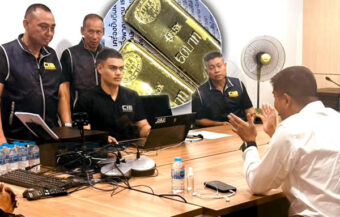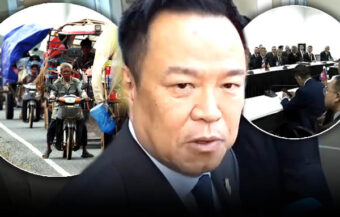Illicit funds are flowing into Thailand through cryptocurrencies, gold, and other assets, driving the baht higher, hitting tourism as visitor numbers fall, forcing suspended trade talks, and sparking political and economic turmoil across the country.
Thailand is facing a mounting political crisis, fueled by a scandal involving illicit scam gangs and hidden funding tied to powerful groups, while instability on the Thai-Cambodian border adds to the turmoil. The crisis forced the Thai-US trade talks to be suspended last Friday. At the same time, the Thai baht has surged 7% over the past year, even as visitor numbers fell 7.4%. Sources in the digital assets industry warn that the rise is driven by illicit capital, funnelled into baht and then converted into gold, property and financial assets. The trend is hitting foreign tourism hard and eroding export competitiveness, while authorities face urgent pressure to trace the flows and stabilise the economy.

The Thai government has launched urgent measures to track the rising value of the Thai baht. Finance Minister Ekniti Nitithanprapas is leading the effort. Meanwhile, most Southeast Asian currencies are either marginally rising or holding their own against the US dollar, whereas the baht has been significantly appreciating. Consequently, analysts are calling the currency’s behaviour in recent months unusual. The rise is affecting Thailand’s foreign tourism sector. In addition, export competitiveness is under increasing pressure.
Foreign tourism levels in Thailand have fallen 7.4% this year. Significantly, this is similar to the rise in the baht in the last 12 months. At the same time, hotel and hospitality prices are approaching Western levels.
As a result, foreign visitors face higher costs while the baht strengthens. Furthermore, analysts warn that this creates a double strain on Thailand’s tourism industry.
Urgent measures launched to address the Thai baht’s surge, impacting tourism and stifling exports
According to reports, foreign fund inflows are partly driving the currency’s unusual surge. These inflows, in turn, often involve swaps into gold and securities in Thailand’s financial markets.
Thailand’s economy is facing dual pressures. On the one hand, competitiveness is declining. On the other hand, international scrutiny is increasing over the country’s potential role in illicit fund flows. Consequently, government officials have been cautious in addressing the matter. Moreover, sensitivity surrounding the issue has delayed decisive policy action.
The baht has strengthened more than 7% since the start of 2025. Furthermore, it has appreciated 12.8% over the past 17 months, rising from ฿37 per US dollar in May last year to ฿32.40 currently. Initially, analysts attributed the increase to regional trends. In addition, other Asian currencies also strengthened as the US dollar weakened. Economists had expected a weaker dollar to reduce trade deficits. They also predicted improved global competitiveness for exporting nations.
However, the baht’s movements deviate from historical patterns. Notably, the currency is moving in tandem with global gold prices. Normally, the baht and gold move in opposite directions. Experts now describe these inflows as “mystery capital.” Specifically, these funds enter Thailand with unclear origins. Dr. Sukphawut Saishir, chairman of the National Economic and Social Development Council, has publicly raised concerns. In particular, he cites Net Errors and Omissions figures that have risen to extraordinary levels.
Mystery capital inflows linked to baht appreciation as experts cite abnormal NEO figures
Cryptocurrency transactions are part of the investigation. According to sources, Thailand’s growing digital asset industry describes alleged operations involving international criminal networks.
These networks reportedly convert cryptocurrency from illegal activity into Thai baht. Subsequently, funds are used to purchase gold, property, and corporate bonds. In this way, authorities say this enables large-scale money laundering through Thailand’s financial system.
The Bank of Thailand lacks comprehensive daily cryptocurrency transfer data. Consequently, analysts warn that this regulatory gap may be exploited by transnational criminal networks.
Thailand’s Net Errors and Omissions figures highlight the scale of unexplained capital flows. The 2022 figure was ฿180 billion. By 2024, it had jumped to over ฿530 billion. However, a later revision reduced the 2024 figure to ฿230 billion. Nevertheless, analysts note roughly $5 billion annually remains unaccounted for.
Cryptocurrency activity and NEO discrepancies reveal scale of illicit capital flows on the economy
In response, the government has established a special task force. The team includes the Fiscal Policy Office, the Bank of Thailand, the Anti-Money Laundering Office (AMLO), the Securities and Exchange Commission (SEC), and the Stock Exchange of Thailand (SET).
Deputy Prime Minister Ekniti Nitithanprapas is coordinating the cross-agency effort. The task force’s main goal is to identify the sources of large fund inflows. It is also tasked with determining if any of these funds are illicit.
Dr. Sukphawut has criticised the Bank of Thailand’s response. He argues that focusing on online gold trading does not address the main problem. According to him, the abnormal surge in NEO figures originates from “grey businesses.”
He says these entities drive the baht’s unusual strength. Dr. Sukphawut also identifies three structural issues influencing the currency. First, Thailand’s inflation rate remains low compared to global peers. Second, persistent current account surpluses continue to affect currency dynamics. Third, predictable central bank bond investment patterns guarantee profits for investors. He stresses that structural reforms are necessary to resolve these issues.
Task force to probe grey businesses and structural issues behind the unusual surge of Thai baht
The suspected ฿500 billion represents more than routine market fluctuations. Analysts say these funds may threaten both domestic and regional financial stability. The government faces pressure to trace and halt what could be one of Southeast Asia’s largest money laundering operations.
Finance Minister Ekniti has outlined plans to track suspicious fund movements. He cited online gambling, scam accounts, and other grey money transactions.
The “data bureau” initiative will synchronise information across financial institutions. Authorities aim to trace beneficiaries and detect unusual transfers. Ekniti stated that the bureau will set updated standards for detecting suspicious flows. Officials expect full implementation by December.
Prime Minister Anutin Charnvirakul has supported the measures. He directed Ekniti to coordinate with the central bank and other agencies. The task force, named “Connect the Dots,” will investigate irregular money flows. Anutin also pledged a broad crackdown on financial crimes. The effort includes targeting scams, human trafficking, and drug networks.
Government task force and data bureau launched to track grey money and strengthen financial oversight
Ekniti described grey money as typically moving through cryptocurrency platforms, cash networks, currency exchanges and gold markets.
Once inside Thailand, these funds are often laundered via high-value assets. Officials cited gold, real estate, diamonds, and luxury vehicles as commonly used assets. The government plans to upgrade monitoring systems for suspicious financial flows. Existing regulations will be aligned with Financial Action Task Force standards.
The Bank of Thailand has maintained that NEO figures do not indicate illegal activity. Officials revised the 2024 figure from ฿530 billion to ฿230 billion. They attributed the change to updated data on oil imports, foreign investment, and trade credit. According to a central bank spokesperson, the figure remains below global and national averages. She stated that NEO is a common statistical occurrence worldwide. She added that the baht’s current value is not affected.
The central bank also emphasised that the 2024 transactions impacted the currency at that time. The reclassification does not exert new pressure on the baht. The Bank of Thailand confirmed its commitment to combating illicit financial flows. Measures include inter-agency collaboration, promotion of digital payments, stricter KYC standards, and monitoring of digital assets.
Bank of Thailand revises NEO figures while reinforcing measures against illicit financial activity
Authorities are working with AMLO to share data on suspicious transactions. Cooperation with the Securities and Exchange Commission allows tracking of cryptocurrency activity. Thailand promotes digital systems like PromptPay to establish verifiable transaction trails. Banks are instructed to enhance monitoring and due diligence. Regulators are also targeting mule accounts used to launder funds.
The Bank of Thailand continues to maintain a cautious approach to cryptocurrencies. Officials have urged closing legal loopholes that could be exploited. Authorities say monitoring systems are being improved continuously. Analysts note that the baht has strengthened despite weak economic indicators. Low inflation, declining tourism, and global challenges make the rise unusual. Structural reforms, they argue, are crucial to stabilise the currency.
Thailand’s special task force coordinates data sharing, investigates inflows, and monitors compliance with international financial standards. Authorities intend to identify illicit operations and tighten regulations where gaps exist. Officials stress transparency and inter-agency cooperation in tracking large capital movements. Analysts focus on the baht’s atypical correlation with global gold prices.
Enhanced monitoring and interagency efforts underway to track capital flows and address baht’s strength
Cryptocurrency and digital assets remain a key concern. Authorities aim to monitor high-value asset transactions, including gold, property, and corporate bonds.
The baht’s rise affects export competitiveness. Regional competitors experience weaker currencies, which complicates Thailand’s trade position. Policy measures are aimed at maintaining stability while curbing potential financial system exploitation.
Thailand’s NEO figures, though revised downward, still indicate significant unexplained capital. Coordination between agencies and financial institutions is expected to clarify these flows. Experts warn that continued mystery capital could impact the baht and broader economy. The government is implementing measures to prevent instability while maintaining growth.
Authorities continue monitoring gold, property, and luxury asset markets for unusual activity. Banks are under stricter regulatory oversight to enforce due diligence. Analysts say the task force’s findings will guide future policy on currency and capital flows. Thailand is seeking to balance oversight with economic performance. Officials emphasise data-driven decisions and continuous updates.
Authorities track high-value transactions and mysterious flows as baht’s rise pressures exports and tourism
In summary, Thailand faces simultaneous economic challenges. The baht has risen sharply despite low inflation and declining tourism. Unexplained capital flows are under investigation. Authorities have formed a cross-agency task force.
The Bank of Thailand, AMLO, the SEC, and the Stock Exchange are coordinating efforts. Measures include stricter monitoring, improved regulation, and alignment with international standards.
Officials maintain that statistical revisions explain part of the anomalies. They stress that the baht remains supported by economic fundamentals. Digital assets, gold, and property transactions remain under scrutiny.
Analysts note structural reforms are necessary to prevent future instability. The government continues to monitor capital inflows and currency movements closely. Updates on findings are expected in the coming months.
Thailand balances monitoring and regulatory oversight to manage baht’s rise and unexplained inflows
The task force is focusing on cryptocurrency exchanges, gold markets, real estate, and luxury asset purchases. Banks are required to enforce due diligence and KYC regulations. Digital payment systems are being used to track fund flows accurately.
Authorities emphasise a coordinated, data-driven approach to detect irregular transactions. Analysts expect task force findings to inform immediate and long-term policy decisions.
Interim government outlines economic policy. Focus on the baht and finances with 1.4% to 1.8% growth
Economists baffled by extraordinary and damaging rise of the baht in 2025 hitting tourism and exports
PM vows action on rising gold exports to Cambodia and the runaway Thai baht against the US dollar this year
The government has committed to transparency and ongoing monitoring. Policy responses will evolve as new data emerges. Authorities aim to identify and halt all illicit fund flows. Coordination among government agencies and financial institutions has begun. However, a lethargic and indecisive response will not do Thailand’s efforts to stabilise the baht, safeguard tourism and protect the financial system.
Notably, the previous government had laid out plans for quantitative easing Thai-style before it lost power over the Thai-Cambodia border crisis. The move would undoubtedly have reduced the value of the baht.
Printing money, allowing more liquidity and a cheaper baht may be the economic medicine Thailand needs
At this time, the government has been warned of unnatural movements. Certainly, a failure to act decisively could bring on an external crisis and a loss of international confidence. Significantly, the central bank has long warned about the cryptocurrency industry going mainstream.
Join the Thai News forum, follow Thai Examiner on Facebook here
Receive all our stories as they come out on Telegram here
Follow Thai Examiner here
Further reading:
Rate cut anticipated as outgoing Bank of Thailand governor attends last Monetary Policy Committee
Last minute tweaks in Bangkok as deal is finalised with U.S. However, Thailand may not match Vietnam


















